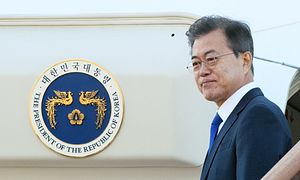May 10, 2019 marks the second anniversary of Moon Jae-in taking up the South Korean presidency. Moon came to office on a wave of popular support after his predecessor Park Geun-hye was impeached over an influence-peddling scandal. Public anger swept Moon to the Blue House and his Democratic Party to a majority position in the National Assembly.
Two years on, Moon is probably best known for his outreach to North Korea, but those efforts have stalled in the wake of a disappointing end to the U.S.-North Korea summit in Hanoi, Vietnam. At home, meanwhile, Moon is struggling to implement promised economic and political reforms, even while dealing with the scandals and dropping approval rates all-too-common to South Korean presidents.
To evaluate where Moon’s administration stands nearly halfway through his single term, The Diplomat spoke to Darcie Draudt, a Ph.D. candidate in the Department of Political Science at the Johns Hopkins University who is currently based in Seoul as a visiting scholar at the Yonsei University Department of Political Science, about the state of South Korean politics, inter-Korean relations, and political and economic reforms.
Moon Jae-in’s approval rating has dropped from a high of 84 percent when he first assumed the presidency to a low of under 45 percent as of April 2019. How should we interpret these falling ratings in terms of the political consequences for Moon’s Democratic Party?
Historically, according to Gallup Korea, most of the democratically elected presidents saw an approximately 20 percentage point decline during their five-year tenures. Left-leaning president Kim Young-sam (1993-1998) saw a notable decline from the 70th percentile down to under an astonishing 10 percent approval by the end of his term; conservative Lee Myung-bak (2008-2013) might be the exception in that he saw a swift initial drop in the first quarter of his term and then stayed fairly steady for the next few years. While these patterns may be unsurprising to longtime watchers of Korean politics, the drop in approval for Moon’s Democratic Party still has some important political consequences for the near term for domestic politics, particularly since his party only holds a slim plurality of seats (128) in the National Assembly. The conservative Liberty Party (which subsumed the popular Ahn Chul-soo’s People’s Party early 2018) and the right-wing Bareunmirae Party hold 114 and 29 seats, respectively. The apparent failure of Moon and his party to accomplish key campaign promises — including electoral reform and economic policies that were a key part of his platform — have cast a shadow on his party’s calls for change and progress following Park Geun-hye’s impeachment.

































